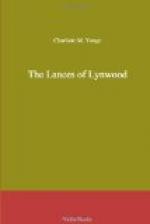“My Lord of Pembroke will allow, however, that I did come in time,” said Sir John. “It was his own presumption and foolhardiness that got him into the scrape, and he was none the worse for the lesson he received. But this young fellow seems to have met with this mischance by no fault of his own; and I am willing to see him righted; for he is a good lad as well as a brave, as far as I have known him.”
“How came the tidings?” asked the Prince. “Did not one of you boys say somewhat of a man-at-arms?”
“Yes, my Lord,” said Arthur; “John Ingram, my uncle’s own yeoman, has come upon Brigliador with all speed. I sent him to the guard-room, where he now waits in case you would see him.”
“Ay,” said old Chandos, “a man would have some assurance that he is not going on a fool’s errand. Let us have him here, my Lord.”
“Cause him to be summoned,” said the Prince to Arthur.
“And at the same time,” said Chandos, “send for my Squire, Henry Neville, to the ante-chamber. The men may get on their armour in the meantime.”
In a few minutes John Ingram made his appearance, the dust not yet wiped from his armour, his hair hanging is disordered masses over his forehead, and his jaws not completely resting from the mastication of a huge piece of pasty. His tale, though confused, could not be for an instant doubted, as he told of the situation in which he had left Chateau Norbelle and its Castellane, “The best man could wish to live under. Well, he hath forgiven me, and given me his hand upon it”
“Forgiven thee—for what?” said the Prince.
“Ah! my Lord, I may speak of treason, but I am one of the traitors myself! Did not the good Knight leave me in charge to make my rounds constantly in the Castle, while he slept after his long watching? and lo, there comes that wily rascal, the Seneschal, Sanchez, with his ’’Tis a cold night, friend John; the Knight wakes thee up early; come down to the buttery, and crack a cup of sack in all friendliness!’ Down then go I, oaf that I was, thinking that, may be, our Knight was over strict and harsh, and pulled the reins so tight, that a poor man-at-arms must needs get a little diversion now and then—as the proverb says, “when the cat’s away, the mice may play.’ But it was drugged, my Lord, else when would one cup of spiced wine have so overcome me that I knew nought till I hear Master d’Aubricour shouting treason in the courtyard like one frantic? But the Knight has forgiven me, and I have sworn to our blessed Lady of Taunton, and St. Joseph of Glastonbury, that not a draught of wine, spiced or unspiced, shall again cross my lips.”
“A wholesome vow,” said the Prince; “and her is a token to make thee remember it,”—and he placed in the hand of the yeoman a chain of some value. “Go to the guard-room, where you shall be well entertained till such time as we need thee again, as we may, if you have been, as you say, long in Sir Eustace Lynwood’s service. But what now? Hast more to say?”




